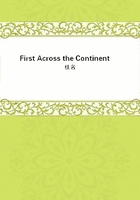
第7章
But we may as well say here that the, so-called elk of the Northwest is not the elk of ancient Europe; a more correct and distinctive name for this animal is wapiti, the name given the animal by the Indians.
The European elk more closely resembles the American moose.
Its antlers are flat, low, and palmated like our moose; whereas the antlers of the American elk, so-called, are long, high, and round-shaped with many sharp points or tines.
The mouth of the great Platte River was reached on the twenty-first of July. This famous stream was then regarded as a sort of boundary line between the known and unknown regions.
As mariners crossing the equator require all their comrades, who have not been "over the line" to submit to lathering and shaving, so the Western voyageurs merrily compelled their mates to submit to similar horse-play. The great river was also the mark above which explorers entered upon what was called the Upper Missouri.
The expedition was now advancing into a region inhabited by several wandering tribes of Indians, chief of which were the Ottoes, Missouris, and Pawnees. It was determined, therefore, to call a council of some of the chiefs of these bands and make terms of peace with them.
After some delay, the messengers sent out to them brought in fourteen representative Indians, to whom the white men made presents of roast meat, pork, flour, and corn-meal, in return for which their visitors brought them quantities of delicious watermelons.
"Next day, August 3," says the journal, "the Indians, with their six chiefs, were all assembled under an awning formed with the mainsail, in presence of all our party, paraded for the occasion.
A speech was then made, announcing to them the change in the government, our promises of protection, and advice as to their future conduct.
All the six chiefs replied to our speech, each in his turn, according to rank. They expressed their joy at the change in the government; their hopes that we would recommend them to their Great Father (the president), that they might obtain trade and necessaries: they wanted arms as well for hunting as for defence, and asked our mediation between them and the Mahas, with whom they are now at war.
We promised to do so, and wished some of them to accompany us to that nation, which they declined, for fear of being killed by them. We then proceeded to distribute our presents.
The grand chief of the nation not being of the party, we sent him a flag, a medal, and some ornaments for clothing.
To the six chiefs who were present, we gave a medal of the second grade to one Ottoe chief and one Missouri chief; a medal of the third grade to two inferior chiefs of each nation; the customary mode of recognizing a chief being to place a medal round his neck, which is considered among his tribe as a proof of his consideration abroad.
Each of these medals was accompanied by a present of paint, garters, and cloth ornaments of dress; and to this we added a canister of powder, a bottle of whiskey, and a few presents to the whole, which appeared to make them perfectly satisfied.
The air-gun, too, was fired, and astonished them greatly.
The absent grand chief was an Ottoe, named Weahrushhah, which, in English, degenerates into Little Thief. The two principal chieftains present were Shongotongo, or Big Horse, and Wethea, or Hospitality; also Shosguscan, or White Horse, an Ottoe; the first an Ottoe, the second a Missouri. The incidents just related induced us to give to this place the name of the Council Bluffs: the situation of it is exceedingly favorable for a fort and trading factory, as the soil is well calculated for bricks, and there is an abundance of wood in the neighborhood, and the air being pure and healthy."
Of course the reader will recognize, in the name given to this place by Lewis and Clark, the flourishing modern city of Council Bluffs, Iowa. Nevertheless, as a matter of fact, the council took place on the Nebraskan or western side of the river, and the meeting-place was at some distance above the site of the present city of Council Bluffs.